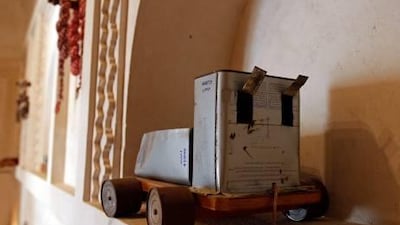SHARJAH // For a few minutes, Obeid bin Sandal forgets he is 65, and is 10 years old again.
Holding a long stick in one hand, and a smaller piece of wood in another, he throws the shorter stick into the air and starts batting it about with the larger one, keeping it in the air before he misses, and the piece of wood hits the floor.
"Ah! I love this game," says Mr Sandal, smiling.
He is demonstrating a 50-year-old Emirati game, al Qabba, where the larger stick, al Qub or al Jub, is used like a bat to swat about the smaller piece, al Qabba, about 20cm long.
Al Qabba and other traditional games will be performed as part of the Sharjah Heritage Festival that begins on February 14.
Similar to baseball or rounders, al Qabba is played with two teams. The al Qabba stick is first placed into a hole, and then each of the players takes a turn hitting it.
The winner is the one who hits al Qabba farthest. The same game can be played with a small wooden ball, known as al Taba.
"We used whatever we found in our environment, be it a stick or rock or even a discarded tin can, and then applied some imagination to it and we had a fun game," said Mr Sandal, who is known in the UAE as the grandfather of traditional Emirati games and toys.
Mr Sandal, a performer, writer and teacher, has made it his mission for the past 30 years to revive a handful of more than 80 games.
There is a permanent exhibition in Sharjah's Heritage Area, and Mr Sandal takes an active role by going to schools across the UAE, teaching younger Emiratis the games their fathers used to play.
"The majority of children these days don't know how to play any of the traditional games, and even their parents have forgotten them," he says.
Tucked in one of the alleys of the Heritage Area, inside an old traditional home, is Mr Sandal's personal collection of toys and exhibits of traditional games. Until about 20 years ago, these games were played by every Emirati boy and girl.
In Mr Sandal's collection are items that were commonly found in a typical Emirati household: clumsily coloured cars made of empty oil canisters, fitted in with tin cans as wheels, and held together by rubber bands. Also in the collection are miniature hand-made dhow boats and collections of seashells, wooden spinning tops and marbles.
"Boys' games focused on strength and speed, while girls' games focused on role play and hopping about," Mr Sandal says. "Children used to be so active and imaginative. Now they are lazy and many of them are getting fat."
Set up officially in 2000 as a museum, the "traditional games and toys" house was moved a month ago into a bigger house just a few alleys down the Heritage Area amid growing interest.
The walls are covered with old photos of some of Mr Sandal's former students, including one of his five-year-old daughter, Maitha, pulling one of the tin cars, and of a teenaged Sheikh Abdullah bin Zayed, now the Minister of Foreign Affairs, playing with other boys.
About 50 students learn these games each year and participate in workshops where they make toys out of household items.
In the past few years, each "player" began to get a Dh300 reward as part of a national drive to keep them coming back and performing on national and heritage-related occasions.
"It has been really hard keeping the new generation interested in the old games. So we have had to start paying them a symbolic amount and giving them prizes," said Maad Salem, a former student of Mr Sandal, who learnt and fell in love with the games 15 years ago.
"I was hit so many times, and came back with bruises and even a broken tooth," he said. "But I loved every minute of it."
Now a policeman, the 29-year-old Mr Salem has made it a point to teach his own children these games.
"They are really fun and encourage teamwork and imagination," he said. "But most of them require big teams and lots of space because they were born out of close-knit communities, a lifestyle we don't have any more."
When a group of Emirati boys playing football at Al Mamzar park recently was asked if they knew any traditional games, they all said: "Yes. Football."
"My father told me he used to ride on sticks and pretend it was a horse," added Mohammed, 13.
While it may be hard convincing children to give up their video games and modern toys for traditional ones, Mr Sandal remains adamant about their superiority.
"If a toy broke down, we simply made another one. And if we were bored, we just ran outside and started chasing each other," he said. "A real childhood."
The games
Al Laqfa
Girls sit in a circle, with 10 pebbles or sea shells on the floor. A bigger pebble is thrown into the air, and with the same hand, pebbles have to be collected from the floor before the large pebble drops.
Al Aarees
Girls use cloth and accessories in their house to make dolls and then the prettiest doll is crowned the bride.
Al Maqana(boys and girls)
A player is blindfolded and has to run around identifying the players, who have a limited space in which to move about.

